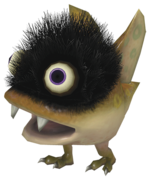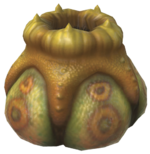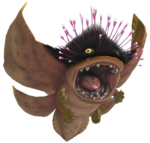Aerodentia family: Difference between revisions
(French note specification.) |
Dolphinius (talk | contribs) m (→Naming) |
||
| (6 intermediate revisions by 3 users not shown) | |||
| Line 1: | Line 1: | ||
{{game icons|p3=y}} | {{game icons|p3=y}} | ||
The '''aerodentia family''' is a family of cave-dwelling, light-sensitive creatures introduced in {{p3}}, although the family went unclassified until {{p3d}}. Its only member is | The '''aerodentia family''' is a family of cave-dwelling, light-sensitive creatures introduced in {{p3}}, although the family went unclassified until {{p3d}}. Its only member is the Vehemoth Phosbat and its several stages of life. Members belong to the ''Tectupervus'' genus. | ||
==Members== | ==Members== | ||
| Line 7: | Line 7: | ||
{{main|Phosbat}} | {{main|Phosbat}} | ||
Scientific name: ''Tectupervus pteromys (juvenile) | Scientific name: ''Tectupervus pteromys'' (juvenile) | ||
The Phosbat is the infant form of the [[Vehemoth Phosbat]]. It bears some notable resemblances to the adult form, including its orange wings, black, hairy head, and big bulging eyes that squint when exposed to light. The noises the Phosbat emits are also similar to that of the adult form. Its legs are stumpy, similar to those of the adult, but it lacks proper arms. It also lacks fluorescent lights upon its head, and only two fangs are visible in its mouth. | The Phosbat is the infant form of the [[Vehemoth Phosbat]]. It bears some notable resemblances to the adult form, including its orange wings, black, hairy head, and big bulging eyes that squint when exposed to light. The noises the Phosbat emits are also similar to that of the adult form. Its legs are stumpy, similar to those of the adult, but it lacks proper arms. It also lacks fluorescent lights upon its head, and only two fangs are visible in its mouth. | ||
| Line 17: | Line 17: | ||
{{main|Phosbat Pod}} | {{main|Phosbat Pod}} | ||
Scientific name: ''Tectupervus pteromys (egg sac) | Scientific name: ''Tectupervus pteromys'' (egg sac) | ||
Phosbat Pods are nest-like organism from which [[Phosbat]]s spawn. If light from a [[Glowcap]] shines on top of one, it closes its opening, preventing it from spawning more Phosbats; it will also stop spawning Phosbats after it has spawned five of them. If a Phosbat Pod doesn't activate before the big light bulb in the [[Vehemoth Phosbat]] arena is turned on, it will remain small. It should be noted that attacking a Phosbat Pod will attract the attention of the Vehemoth Phosbat; this is a reasonable, motherly response. | Phosbat Pods are nest-like organism from which [[Phosbat]]s spawn. If light from a [[Glowcap]] shines on top of one, it closes its opening, preventing it from spawning more Phosbats; it will also stop spawning Phosbats after it has spawned five of them. If a Phosbat Pod doesn't activate before the big light bulb in the [[Vehemoth Phosbat]] arena is turned on, it will remain small. It should be noted that attacking a Phosbat Pod will attract the attention of the Vehemoth Phosbat; this is a reasonable, motherly response. | ||
| Line 34: | Line 34: | ||
==Naming== | ==Naming== | ||
The family | The family name is derived from ''aero'' and ''dentia'', Latin for "air" and "tooth" respectively. Its name could mean "toothed flier". | ||
The family genus, ''Tectupervus'', is possibly a combination of ''tectum'' and ''pervolo'', Latin for "shelter" and "to fly through", respectively. Putting these two meanings together, the genus could mean "sheltered flier". | |||
===Names in other languages=== | ===Names in other languages=== | ||
| Line 44: | Line 45: | ||
|JapM = Yellow pattern moth family | |JapM = Yellow pattern moth family | ||
|ChiTrad = 橫紋蛾科 | |ChiTrad = 橫紋蛾科 | ||
|ChiTradR = Héng Wén É Kē | |||
|ChiTradM = | |||
|Fra = broyidés | |Fra = broyidés | ||
|FraM = From ''Broidunoir'' (Vehemoth Phosbat) or ''Broidugris'' (Phosbat). ''Noir'' and ''gris'' are colors, usually used to describe unilluminated place. ''Broi'' (Broyeur, broyer) means blending or grinding, ''yidés'' is a suffix. It is a pun on how creatures from this family blend into the darkness. | |FraM = From ''Broidunoir'' (Vehemoth Phosbat) or ''Broidugris'' (Phosbat). ''Noir'' and ''gris'' are colors, usually used to describe unilluminated place. ''Broi'' (Broyeur, broyer) means blending or grinding, ''yidés'' is a suffix. It is a pun on how creatures from this family blend into the darkness. | ||
|Kor = 노랑문양나방 | |Kor = 노랑문양나방 | ||
|KorR = Nolangmun-Yangnabang | |||
|KorM = Yellow-Patterned Moth | |||
|Spa = Aerodentios | |Spa = Aerodentios | ||
|SpaM = From English name | |SpaM = From English name | ||
Latest revision as of 17:50, October 29, 2024
The aerodentia family is a family of cave-dwelling, light-sensitive creatures introduced in Pikmin 3, although the family went unclassified until Pikmin 3 Deluxe. Its only member is the Vehemoth Phosbat and its several stages of life. Members belong to the Tectupervus genus.
Members[edit]
Phosbat[edit]
- Main article: Phosbat.
Scientific name: Tectupervus pteromys (juvenile)
The Phosbat is the infant form of the Vehemoth Phosbat. It bears some notable resemblances to the adult form, including its orange wings, black, hairy head, and big bulging eyes that squint when exposed to light. The noises the Phosbat emits are also similar to that of the adult form. Its legs are stumpy, similar to those of the adult, but it lacks proper arms. It also lacks fluorescent lights upon its head, and only two fangs are visible in its mouth.
Phosbat Pod[edit]
- Main article: Phosbat Pod.
Scientific name: Tectupervus pteromys (egg sac)
Phosbat Pods are nest-like organism from which Phosbats spawn. If light from a Glowcap shines on top of one, it closes its opening, preventing it from spawning more Phosbats; it will also stop spawning Phosbats after it has spawned five of them. If a Phosbat Pod doesn't activate before the big light bulb in the Vehemoth Phosbat arena is turned on, it will remain small. It should be noted that attacking a Phosbat Pod will attract the attention of the Vehemoth Phosbat; this is a reasonable, motherly response.
Vehemoth Phosbat[edit]
- Main article: Vehemoth Phosbat.
Scientific name: Tectupervus pteromys
The Vehemoth Phosbat is a boss in Pikmin 3, and is the second boss encountered in Story Mode. It is a large, bioluminescent moth-like creature with massive orange wings, yellow eyes, small stumpy limbs, and a large gaping whale-like mouth. It can absorb small amounts of light to turn transparent and create a vortex in its mouth to consume prey without needing to descend.
Naming[edit]
The family name is derived from aero and dentia, Latin for "air" and "tooth" respectively. Its name could mean "toothed flier".
The family genus, Tectupervus, is possibly a combination of tectum and pervolo, Latin for "shelter" and "to fly through", respectively. Putting these two meanings together, the genus could mean "sheltered flier".
Names in other languages[edit]
| Language | Name | Meaning |
|---|---|---|
| オウモンガ科? Ou mon ga ka |
Yellow pattern moth family | |
(traditional) |
橫紋蛾科 Héng Wén É Kē |
|
| broyidés | From Broidunoir (Vehemoth Phosbat) or Broidugris (Phosbat). Noir and gris are colors, usually used to describe unilluminated place. Broi (Broyeur, broyer) means blending or grinding, yidés is a suffix. It is a pun on how creatures from this family blend into the darkness. | |
| Flatterbeißer | Flutter biters | |
| 노랑문양나방 Nolangmun-Yangnabang |
Yellow-Patterned Moth | |
| Aerodentios | From English name |


